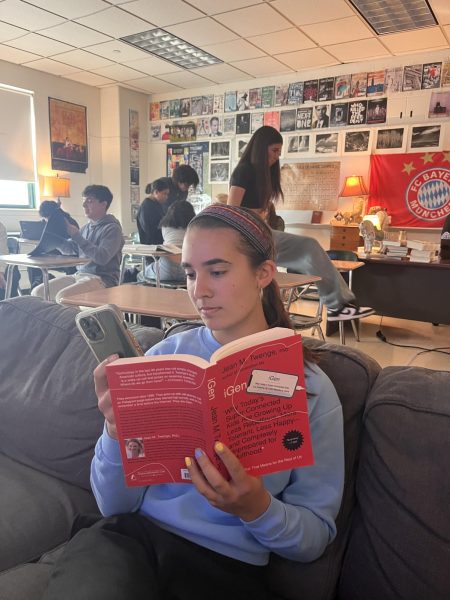Students argue for more free speech at DHS

Luke Remchuk, of Bethesda, Md., left, Kevin Newcomb, of Bethesda, Md., center, and Jay Hartman, of Adelphi, Md., right, protest for students free speech outside the Supreme Court in Washington, Monday, March 19, 2007. (AP Photo/Evan Vucci)
Section 38M of the General Laws from the Commonwealth of Massachusetts states, “School committees of cities, towns and regional school districts shall meet at least once every other month, during the months school is in session, with a student advisory committee.” This law allows for student representatives to be present at school committee meetings.
These student representatives may discuss topics regarding activities pertaining to the school, or they can comment on any issue so long as it is on the agenda at that school committee meeting in accordance with Robert’s Rules of Order. This set of rules that governs parliamentary procedure states that a topic is not allowed to be discussed at a meeting if it is not on the agenda.
“The goal of this law is to give everyone a fair chance to have their voice heard on important issues,” said School Committee Member Shannon Jenkins. “If the School Committee could take up any issue with no notice to anyone, it would be difficult for others to get involved.” So long as that is the case, the School Committee wants to make sure everyone’s voice is heard.
“I think the role of the student representative is to allow students to have a voice in important issues that the School Committee is discussing – things like school choice, the school calendar, or school start times,” said Dr. Jenkins.
At DHS these student representatives are selected by the administration. However, therein lies another problem.
The law continued from section 38M of Commonwealth of Massachusetts states, “With a student advisory committee to consist of five members to be composed of students elected by the student body of the high school or high schools in each city, town or regional school district.”
Our school doesn’t have any specific committee as this. The law continues, “The members of such student advisory committees shall, by majority vote prior to the first day of June in each year elect from their number a chairperson who shall serve for a term of one year.” School Committee Representatives at our school are not voted on as the law clearly states that they should be. Rather, they are selected by administration. In addition, our representatives only go to one meeting at a time, they do not serve year-long terms as MA law stipulates.
Bad enough as it is that we aren’t even choosing our representatives correctly, but we are putting pressure on them prior to the meeting. According to this year’s School Committee Representatives, Dean Janice Sharp called each rep to her office prior to the meeting and told them not to say anything negative about DHS. They were told only to share the good things about our school and not to talk about issues or concerns because the School Committee does not want to hear about those.
“[Mrs. Sharp] was nice about it,” said one school committee rep who wished to remain anonymous, “but I still felt uncomfortable being told what I could and couldn’t say.” The other representatives felt very uncomfortable with this as well. They wanted to get their voices heard, but they did not want to risk getting in trouble with the administration.
“I suggest that they talk about things going on at the the high school,” said Mrs. Sharp. “Their purpose is to give insight on what’s going on at DHS. It’s a law that they can’t talk about issues without them being on the agenda.” While true that these items should be on the agenda, there may be some pressure at work that influences what students believe they are allowed to say.
“I do not think it is fair to say the School Committee doesn’t want to hear about any issues pertaining to the high school,” said Dr. Jenkins. “It’s important to have a student representative present at school committee meetings because it is important to hear students’ perspective about any issues they think are important.”
Another situation that has changed from last year is the process by which Student Council has been able to voice its concerns to the administration.Typically, the process was through Student Council and Principal’s Advisory.
However, Principal John Gould and Mrs. Sharp decided to mix up Principal’s Advisory. Random students were selected and added to Principal’s Advisory.
At these meetings, Dr. Gould and Mrs. Sharp have come up with their own agenda. Some of these topics have included: Introducing Superintendent Bonnie Gifford; Positive Behavior Interventions and Supports (PBIS); picnic tables; and a new “Big Green Goes Green” bulletin board for the front of the school. As a result, Student Council’s agenda items are hardly ever addressed at Principal’s Advisory meetings, and if they are, they’re rushed through at the end of the meeting after the other agenda items.
Everything discussed is brought to us by the administration.
“It’s basically just the administration bringing to us what they’ve done and asking us our opinion, but we have no say in it,” said Senior Class President and Principal’s Advisory Member Bryce Boswell. “It seems like the changes they are making are to suit the administrators, not the students.”
“[Dr. Gould] doesn’t really let us get a word in edgewise without dominating the conversation,” said one student council member who wishes to remain anonymous.
This is supposed to be a student-run committee. However, students feel like they would rather be in class than at these meetings. They feel uncomfortable speaking their minds and don’t want to say the wrong thing and end up getting in trouble for it.
We’re elected to Student Council, and we’ve become members of Principal’s Advisory because it is our duty as student leaders to voice the concerns of our peers and the entire student body. The fact that almost every time we speak we’re cut off or interrupted leads us to feel as if our opinions don’t matter, and that we’re letting down our fellow students.
“What’s turning a lot of the students against the administration is a mutual upset between students and teachers about how the administration is dealing with situations,”said Boswell.
The frustrated Student Council officers requested a meeting with Dr. Gould and Mrs. Sharp to discuss a new format for voicing Student Council concerns. Luckily, we came to an agreement: Dr. Gould would come to the last 15 minutes of our Student Council meetings to listen to our concerns and supply us with some kind of feedback right then. If the issue needed more work, it would be further addressed.
This agreement seemed to be a happy medium. However, at the first meeting Dr. Gould and Mrs. Sharp visited, it was clear that things were going to be different than we expected. Students brought up several issues and gave their opinions and ideas for possible solutions, but Dr. Gould made it clear that he was set in his own way.
One of the topics discussed was the status of the Lunch Show. Dr. Gould stated that there are still parameters being worked out for the airing of the lunch show. When students tried to express to him their reasons for wanting it back, a lot of us were shut down immediately.
“[Dr. Gould] never actually defined such parameters,” said senior Student Council Vice-President Max Westner.
It frequently happens to us as student leaders that the administration says they are open to change, but once we are actually conversing with them about the topic, we soon realize that it’s their way or the highway.
“Administration pretends to listen to us and puts up a front that they’re all for the students, but in actuality, they do whatever suits them best,” said one student council member who wishes to remain anonymous.
“We’re open to kid’s ideas,” said Dr. Gould when informed about these student concerns. “It’s tough to hear that students feel that way. They’re always welcome to come talk to me.” In order to work together, everyone needs to be open to compromise and to be able to listen to one another.
“I feel like if we don’t make a change now, there are going to be many more changes to come that will upset a lot more people,” said Boswell.







Brian • Feb 4, 2016 at 11:26 am
All the School Committee has to do is put a “Student Representative’s update” on the agenda. That is broad enough for the student to say whatever they want during the meeting, good or bad.
Anonymous • Jan 30, 2016 at 11:13 am
I as a student reading this article am not only confused, but in a way I feel misled by the governing bodies at our high school. How can Dr. Gould say to the student body that they are allowed to converse with him on such issues and that he actually encourages it, then dismiss or seem uninterested to thoroughly discuss those same ideas when brought to his attention on a face to face basis? From reading this article I’m getting the feeling that my fellow DHS students that have been elected to speak are not getting the chance to have a productive, civil, and fair discussion on matters that directly affect my life at DHS. I’m concerned that some of our our strongest voices and some of our most brilliant thinkers are not being given the chance to put those very important talents to good use. Overall this news or how our administration and governing bodies operate behind closed doors is more than just alarming. It takes away a sense of importance and the feeling of progressive thinking that made my CHOICE in High schools so easy. This news disappoints me more than anything else, I had thought better of Dartmouth High School Administrative staff.
Ben Kahrl • Jan 29, 2016 at 6:51 pm
This is classic “fake democracy”. We cannot teach students to be active citizens engaged in democracy unless we actually live it, teach it, and let them take part in it in a substantive meaningful way. That means allowing them to come to decisions about things and say things with which we might not agree. From all you describe, it seems like the administrators want the appearance of democracy but to control what the students say and to whom. It is tough to run a school and often tough to listen to advice you don’t agree with, but in the long run, when students, and teachers actually, are given substantive meaningful roles in a school, they buy into the system far more in the end and the school is a better place for their support.
Nicely written article, Ms. Koczera
Anonymous • Jan 29, 2016 at 3:33 pm
The writing itself is a little rough, but the content matter is something many have said but felt unable to speak out about. Glad to see the Spectrum is being used as a platform for voicing these concerns, and kudos to the author for having the courage to do so.
sam brodsky • Jan 29, 2016 at 7:59 am
it took some guts to write that. good job.